Books
Isaac Parker, the Hanging Judge
His Wikipedia page tells us:Parker became known as the "Hanging Judge" of the American Old West, because he sentenced numerous convicts to death.[1] In 21 years on the federal bench, Judge Parker tried 13,490 cases. In more than 8,500 of these cases, the defendant either pleaded guilty or was convicted at trial.[2] Parker sentenced 160 people to death; 79 were executed.
Read a memoir that appeared two years after his death at this link.
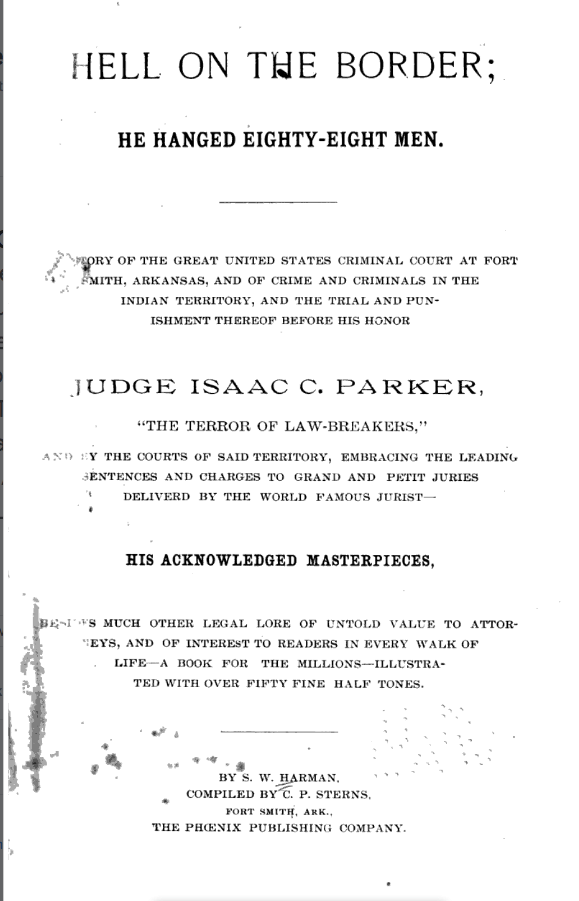
Posted By: Paul - Fri Sep 17, 2021 -
Comments (2)
Category: Death, History, Wild West and US Frontier, Law, Books, Nineteenth Century
The Bear Facts
Anti-communist fable presented as a kid's book.More pictures and discussion here.
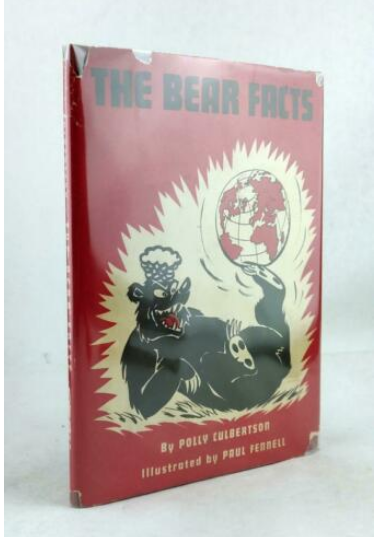
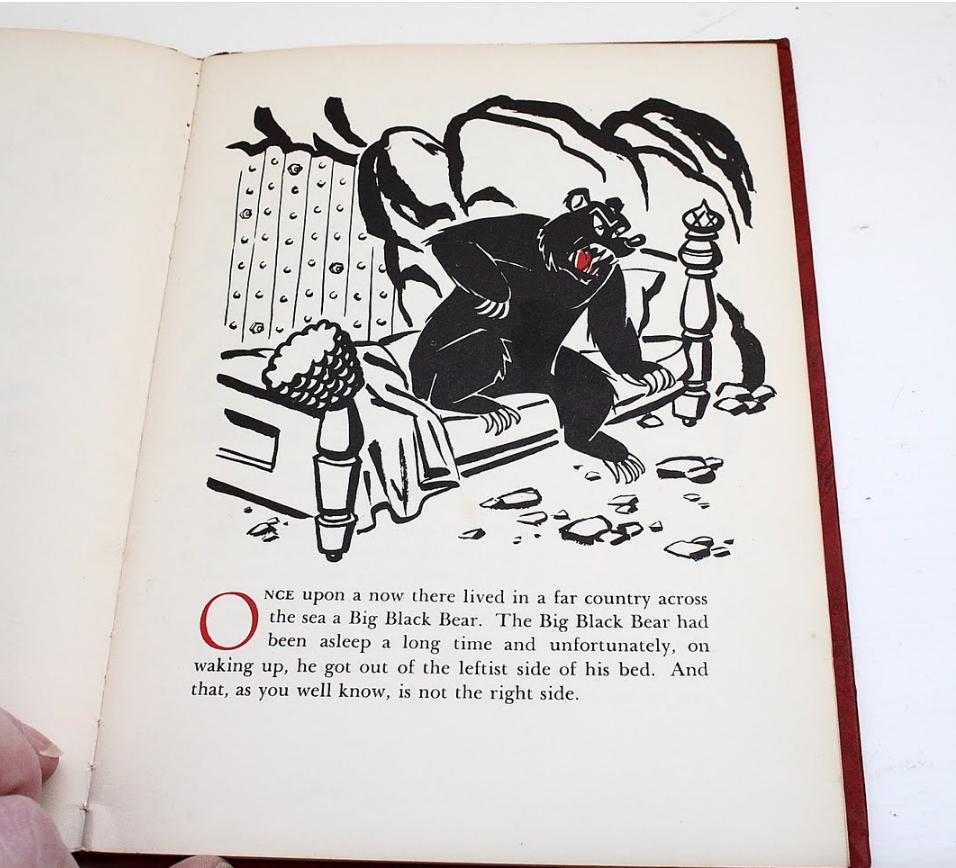
Posted By: Paul - Thu Sep 02, 2021 -
Comments (0)
Category: Propaganda, Thought Control and Brainwashing, Children, Books, Fantasy, 1940s, Russia
New Trends in Table Settings
By Lucy Staley from Hearthside Press. 1968.This is the book to get you up to speed on the exciting art of table setting. From the review in The Bradenton Herald (Dec 22, 1968):
You can get it on loan from archive.org.


"Table for a Hawaiian luau"

"Easter dessert table"

"Strutting cocks from Spain frame an arangement in a basket"
Posted By: Alex - Mon Aug 30, 2021 -
Comments (0)
Category: Boredom, Kitsch and Collectibles, Books
Who’s Nobody in America
Back in 1979, when being in Who's Who still had some kind of cultural cachet, Derek Evans and Dave Fulwiler decided to create an anti-Who's-Who, which they called "Who's Nobody in America." To acquire entries, they placed the following ad in newspapers:Will your name be omitted from the 1980 edition of Who's Who?
Nobody Press is currently compiling the 1980 edition of Who's Nobody in America. This handsomely bound and widely distributed reference work will, for the first time, provide a comprehensive list of American nobodies.
If you think you might be a nobody, or know of one, at no cost or obligation, complete the attached request for applications."
Applicants included:
- A woman who complained she had been seeing her psychiatrist monthly for eight years and he often called her Evelyn. Her name was Mildred.
- An entire American Legion post in Newport, Ky.
More info: Washington Post

Posted By: Alex - Sat Aug 28, 2021 -
Comments (1)
Category: Clubs, Fraternities and Other Self-selecting Organizations, Success & Failure, Books, Satire
The Power of Prayer on Plants
According to the Rev. Franklin Loehr, prayer could supercharge the growth of plants. Pretty much any prayer would work. He detailed his argument in his 1959 book The Power of Prayer on Plants.When Richard Nixon was told of Loehr's results, he reportedly said, "That sounds like a good kind of thinking to me."
However, in 1961, a group of Harvard students tried to replicate Loehr's results and failed to do so. In fact, in their experiment the plants that weren't prayed for at all grew better than plants that were prayed for by either skeptics or believers.
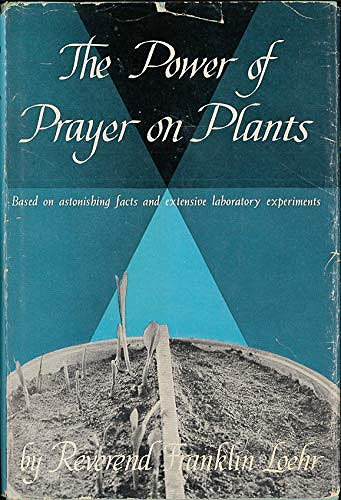
More details from Newsweek (Apr 13, 1959):
Can prayer make plants grow faster and bigger? Skeptics think it laughable, scientists find it irrelevant, and farmers tend to rely on more mundane methods to increase their crops. But the Rev. Franklin Loehr is convinced that the answer is yes, and has just written a book, "The Power of Prayer on Plants," to tell why.
After five years and 900 experiments, the 46-year-old Presbyterian minister reports he and 150 members of his prayer group found that prayed-for wheat and corn seeds grew into bigger seedlings than ones which got no prayer or outright negative prayer. Commenting on their methods last week in his Los Angeles home, Mr. Loehr explained that they used every kin of prayer and found every one effective to a degree.
"There were silent and spoken prayers," he continued, "those to loved ones, and the humble prayer straight to God. But mostly people just talked to the plants, loved them, or scolded them. First I tried buddying up to them, and then I observed that the people getting better results were approaching the plants on their own level of consciousness."
Picking up a copy of the book, he pointed to the jacket, which shows a lone, stunted shoot on the no-prayer side of an experimental seedbed. "He wasn't supposed to be there," explained Mr. Loehr, "so we blighted him with three bursts of negative command."
Mr. Loehr dropped the experiments two years ago, having persuaded himself, at least, of their validity. He is now concentrating on "soul dynamics" prayer for people—not, of course, to make them grow faster and bigger. "The fact is," he concluded, "we used plants to test prayer just as the artificial heart is tested in dogs instead of humans."
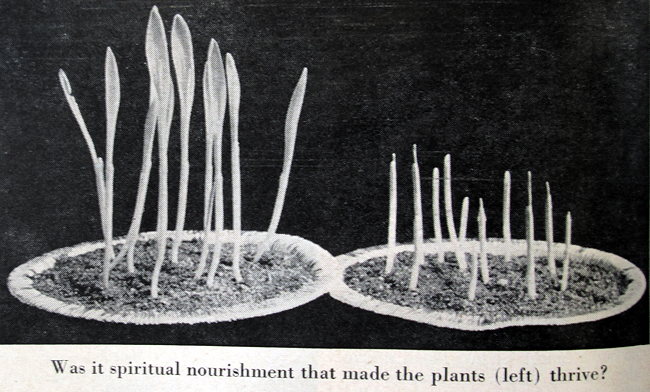
Along similar lines, see our previous post "Does holy water help radishes grow better?"
Posted By: Alex - Fri Aug 06, 2021 -
Comments (2)
Category: Religion, Experiments, Books, 1950s
Octogenarian Teetotalers
Published by the National Temperance League of London in 1897. It contained 113 portraits of teetotalers who were over the age of 80.Unfortunately, there was no companion volume of Octogenarian Tipplers.


image source: Bizarre Books
Posted By: Alex - Thu Jul 29, 2021 -
Comments (2)
Category: Elderly and Seniors, Inebriation and Intoxicants, Books
A Dummy Goes to Africa
Unfortunately, the book is not digitized, and original copies go for big bucks. But you can see more pics and read an account of the tale at the link.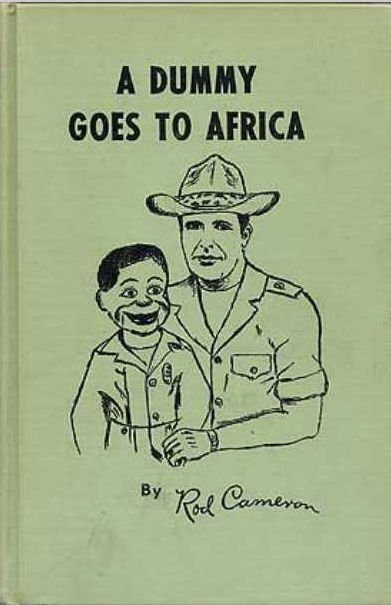
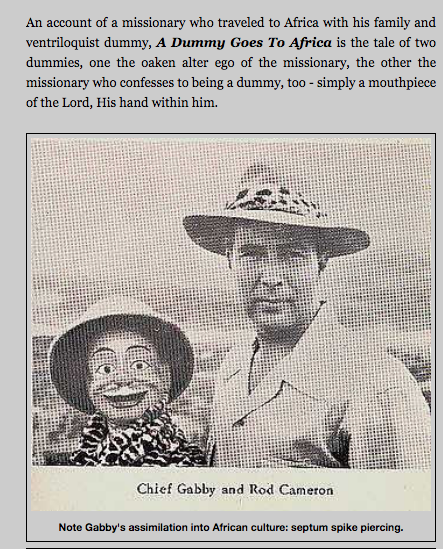
Posted By: Paul - Wed Jul 21, 2021 -
Comments (0)
Category: Puppets and Automatons, Religion, Books, 1960s, Africa
Fifty Years in the Magic Circle
Life for a Victorian magician wasn't always easy, with the audience using live ammunition.Read the whole thing here.
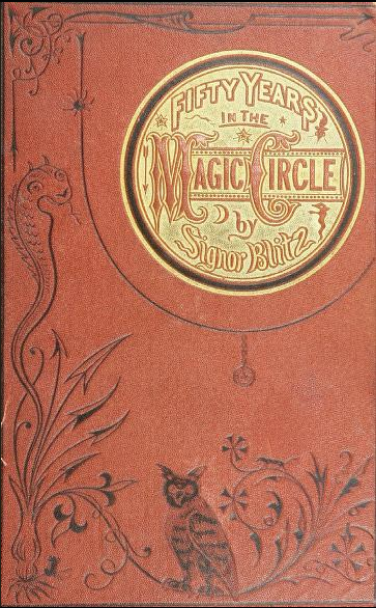
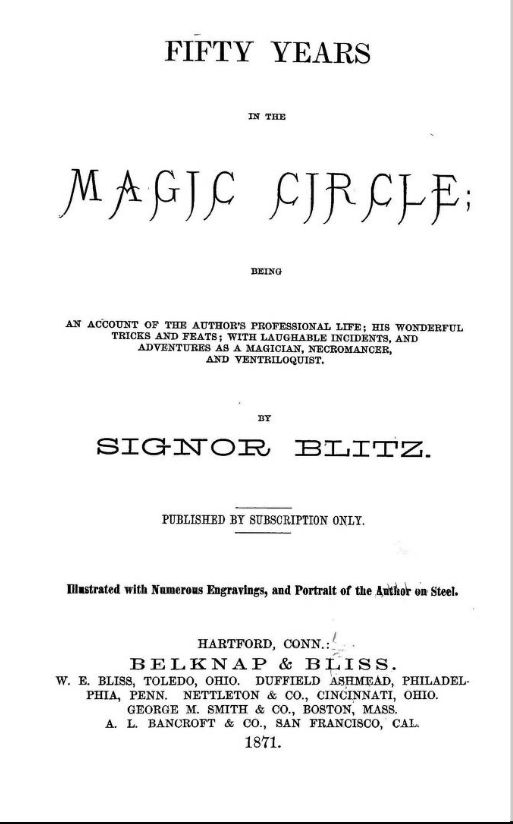
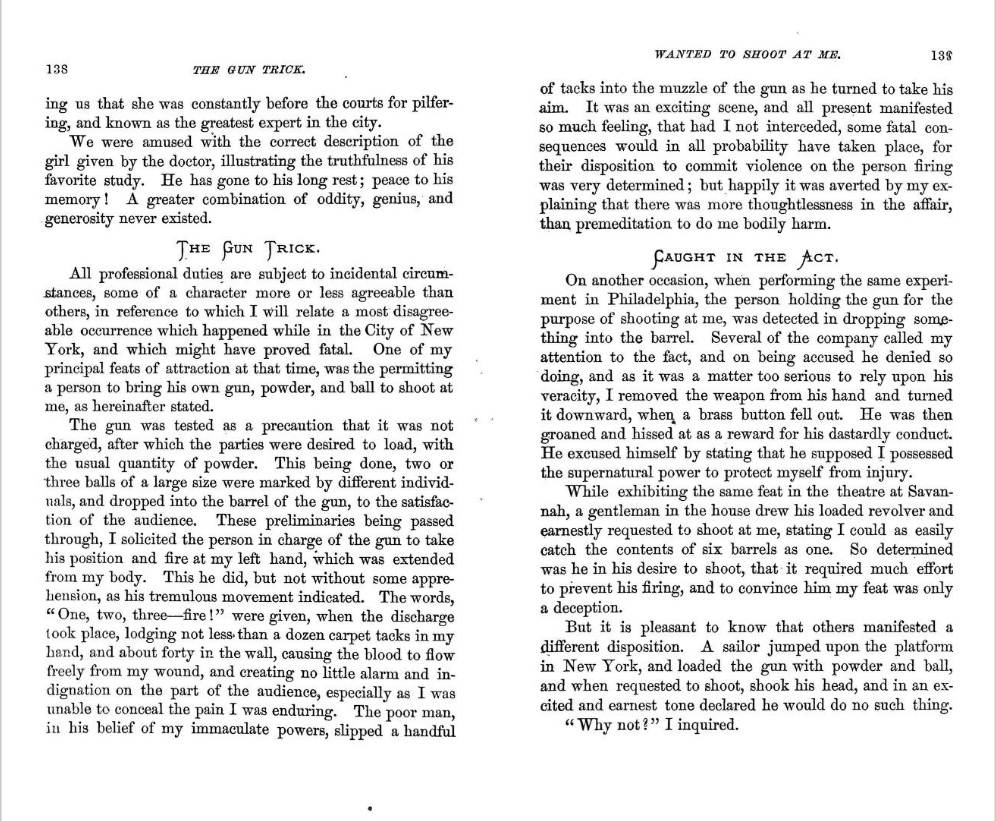
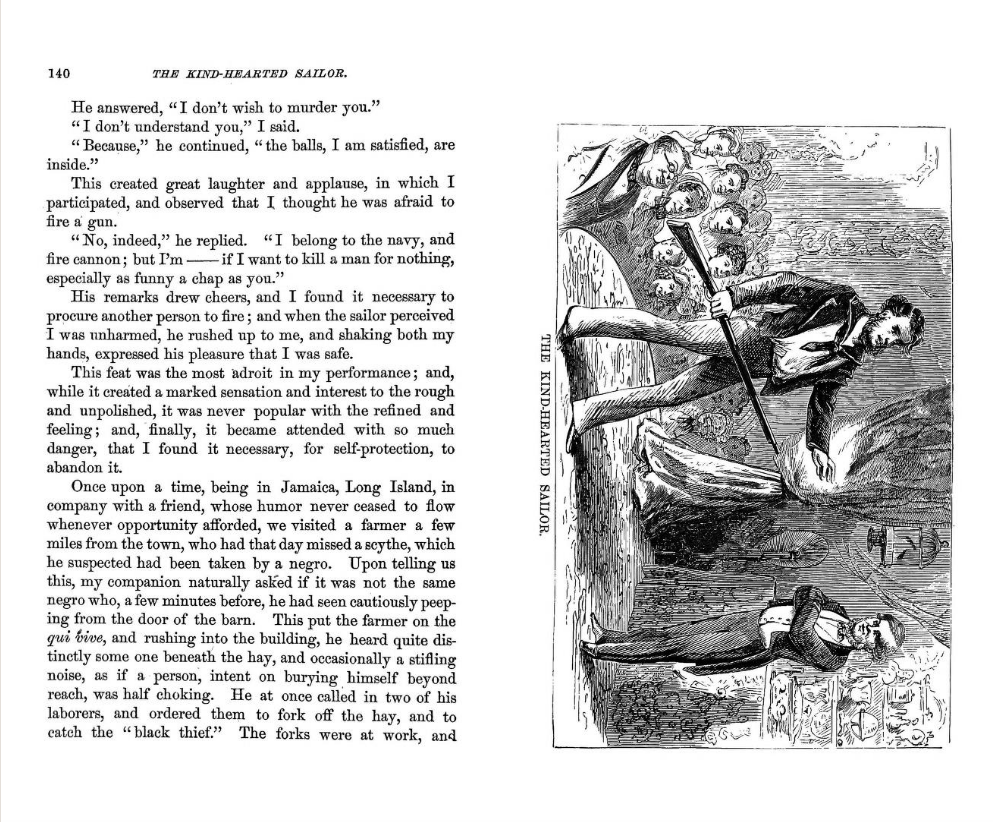
Posted By: Paul - Sat Jul 17, 2021 -
Comments (0)
Category: Magic and Illusions and Sleight of Hand, Books, Nineteenth Century
Banvard’s Folly
I am halfway thru reading this book and can testify to its greatness, and to its allure for all WU-vies. I have already learned about so many hoaxes, weirdos and charlatans I never knew about before.Here's how the book opens:
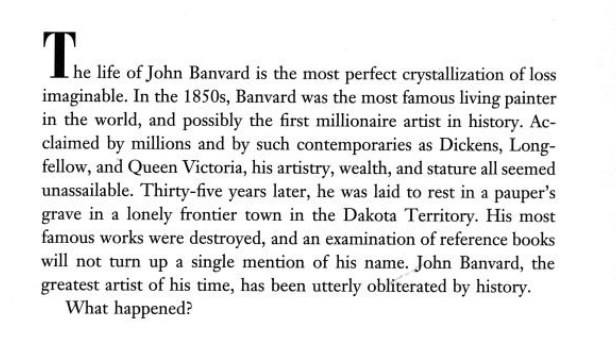
Posted By: Paul - Thu Jul 01, 2021 -
Comments (8)
Category: Frauds, Cons and Scams, History, Historical Figure, Hoaxes and Imposters and Imitators, Inventions, New Age, Supernatural, Occult, Paranormal, Books, Goofs and Screw-ups
The Boy Fancier
Published in 1912, the title of this book really hasn't aged well. Although even in 1912 I imagine the title could easily have been misconstrued.Looking up the word 'fancier' in the dictionary, I found that it means: "a connoisseur or enthusiast of something, especially someone who has a special interest in or breeds a particular animal." I hadn't known that the word had this association with animal breeding.
Nature offered this review of the book:

Posted By: Alex - Wed May 26, 2021 -
Comments (5)
Category: Animals, Books, 1910s

| Who We Are |
|---|
| Alex Boese Alex is the creator and curator of the Museum of Hoaxes. He's also the author of various weird, non-fiction, science-themed books such as Elephants on Acid and Psychedelic Apes. Paul Di Filippo Paul has been paid to put weird ideas into fictional form for over thirty years, in his career as a noted science fiction writer. He has recently begun blogging on many curious topics with three fellow writers at The Inferior 4+1. Contact Us |




